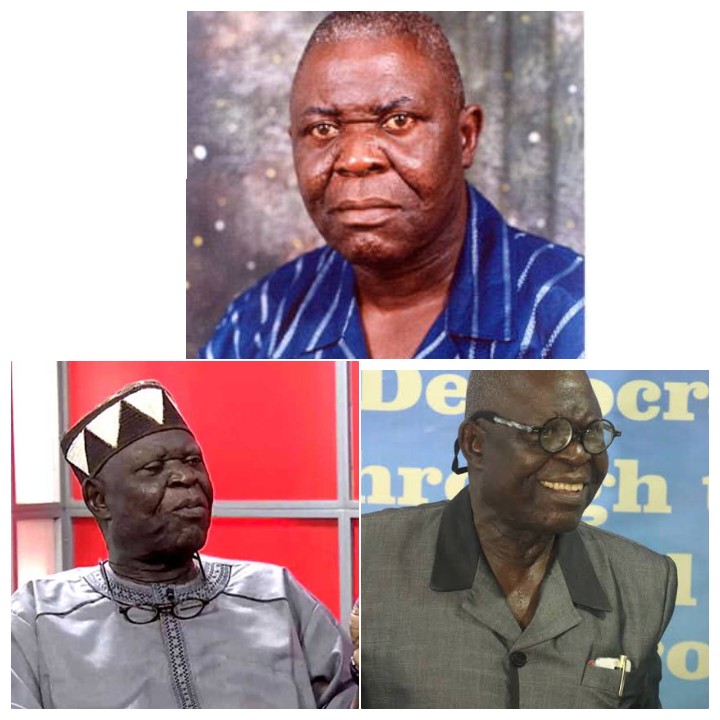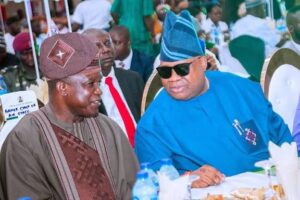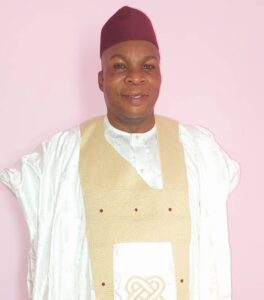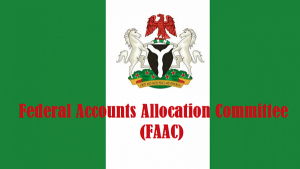
By Abdulfatai Tomori
Few individuals in Nigeria’s history embody the unyielding spirit of advocacy like Chief Ayo Opadokun. His steadfast commitment to democracy, justice, and equitable governance has made him a formidable voice in the country’s socio-political landscape. His steadfast advocacy for restructuring, which appears frequently in his publications, media appearances, and public speeches, is essential to his vision for a better Nigeria. To him, restructuring is not just a policy idea but a necessary pathway to addressing the systemic dysfunctions that have stalled Nigeria’s progress for decades. Opadokun’s arguments resonate deeply in a country grappling with escalating socio-political and economic crises. His advocacy urges Nigerians to confront a profound and often uncomfortable question: Is Nigeria truly a unified nation bound by a shared purpose, or merely a patchwork of disparate regions tenuously held together by convenience?
This question, though pressing, is far from new. It has reverberated through the annals of Nigeria’s history—spanning intellectual debates, grassroots activism, and political discourse. From the independence struggles to contemporary times, it underscores the complex realities of a nation rich in diversity yet challenged by its inability to harness this multiplicity into a cohesive identity. For me, this discourse became personal in 2013, when I had the privilege of meeting Chief Opadokun at his Yaba office in Lagos. Accompanied by my partner, Lukman Afolabi, I experienced firsthand the warmth and integrity of a man whose vision for Nigeria transcends ethnic, religious, and regional divides. That encounter left a lasting impression, sharpening my understanding of Nigeria’s challenges and strengthening my belief in the necessity of Chief Opadokun’s vision for restructuring. At the heart of Chief Opadokun’s argument is a conviction that Nigeria’s current centralized governance system is fundamentally flawed.
As the convener of the Coalition of Democrats for Electoral Reforms (CODER) and former Secretary of Afenifere, he has consistently decried the inefficiencies, inequities, and corruption bred by this system. His critique is not limited to the symptoms of Nigeria’s challenges—economic instability, growing insecurity, and social discontent—but extends to their root causes: a governance framework that prioritizes the interests of a privileged few while marginalizing the vast majority. Chief Opadokun’s vision for restructuring is both historical and pragmatic. He advocates for a return to the federal structure established by Nigeria’s 1960 Independence Constitution, which recognized the country’s multi-ethnic, multi-religious composition. This system, rooted in regional autonomy and parliamentary governance, fostered a golden era of political stability and economic progress during the First Republic.
By contrast, the imposition of the presidential system by the military under Generals Murtala/Obasanjo marked a significant departure, embedding a centralized model ill-suited to Nigeria’s diversity. The centralized presidential system, according to Chief Opadokun, has entrenched inefficiency and waste, consuming an unsustainable 80% of national earnings on recurrent expenditures. This leaves minimal resources for critical capital projects essential to development. The impact of this imbalance is visible in Nigeria’s decaying infrastructure, inadequate public services, and the persistent decline in the quality of life for ordinary citizens. Over-centralization has also stifled innovation at the state and local levels, creating an over-dependence on federal allocations and fostering a culture of complacency.
Resource-rich regions, such as the Niger Delta, remain impoverished, fueling resentment and unrest as the elite exploit systemic inefficiencies for personal gain. Chief Opadokun believes that restructuring is not merely about redistributing power but redefining governance to align with Nigeria’s rich diversity. He advocates for the establishment of state policing, which would address security challenges by empowering local communities to take ownership of their safety. He also emphasizes the need for equitable resource control and legislative devolution, arguing that these measures would not only foster regional development but also promote national unity by giving every community a stake in Nigeria’s success. This vision is deeply rooted in the ideals of Chief Obafemi Awolowo, one of Nigeria’s foremost political thinkers.
Awolowo championed a federal socialist democracy, where regions had the autonomy to develop policies suited to their unique circumstances. Awolowo believed that genuine progress could only come when governance structures reflect the rich cultural, economic, and social tapestry of Nigeria’s diverse communities. By implementing a decentralized system, we could avoid situations like the rejection of President Tinubu’s proposed tax reforms by Northern leaders. Instead, regional autonomy would allow communities the freedom to adopt policies tailored to their specific needs, fostering a collaborative spirit in national governance and moving away from the imposition of one-size-fits-all policies. Chief Opadokun’s call for decentralization mirrors this philosophy, emphasizing that genuine progress can only be achieved when governance structures reflect the cultural, economic, and social realities of Nigeria’s diverse communities.
The urgency of Chief Opadokun’s call is underscored by Nigeria’s current economic crisis. The removal of fuel subsidies, intended as a fiscal stabilization measure, has instead exacerbated hardship for millions. The cost of living has soared, with transportation and food prices reaching record highs. Many families are grappling with economic hardship, highlighting a critical issue affecting numerous communities. The relentless cycle of poverty is intensified by rising costs and insufficient support systems, making necessities like clothing and education seem like privileges rather than rights. Parents often face heart-wrenching decisions, such as choosing between feeding their children or paying for school fees—decisions no parent should have to confront.
The stories of families selling their properties to secure their children’s education reflect a systemic failure to provide affordable, quality education for all. The similarities in high costs between federal and private institutions contribute to a bleak landscape for families aspiring for better futures. Essential items like baby food, diapers, and medications are becoming increasingly unaffordable, leaving families struggling to meet even the most basic needs. Additionally, the belief that inflation figures are underestimated adds an unsettling layer of uncertainty, forcing families into high-interest loans and creating a cycle of debt that is difficult to escape. The increase in begging on the streets serves as a painful reminder of the desperation in many communities, as disposable incomes evaporate under rising prices. This narrative is not just a statistic; it is a call to action for comprehensive social policies that address the root causes of poverty and provide meaningful support for families.
As communities strive for solutions to Nigeria’s deepening socio-economic challenges, systemic change that prioritizes the well-being of all citizens becomes ever more critical. Fundamental rights—such as access to quality education, proper nutrition, and basic human dignity—remain out of reach for many. This stark reality is juxtaposed with a government operating on extravagant budgets, seemingly detached from the urgency and compassion required to address the nation’s growing inequalities. Opportunities for investment are dwindling, productivity remains stagnant, and vital economic indicators continue to spiral downward. The middle class—long regarded as the backbone of a thriving society—is rapidly disintegrating, leaving an ever-widening gulf between an affluent elite and an increasingly impoverished majority.
The administration of President Bola Tinubu faces harsh criticism for excessive borrowing, lavish spending, and the inability to assemble a competent economic team. The decision to peg budget borrowings at an unfavourable exchange rate of N800 to the dollar has only compounded these issues. Corruption flourishes unchecked, enriching a select few while millions struggle for survival. One glaring example of inequality is the oil sector, where systemic loopholes allow a privileged minority to amass wealth, further entrenching the divide between rich and poor. Governance failures—including pervasive corruption, widespread tax evasion, and unchecked illicit financial flows—have created a system rigged in favour of the elite. Public administration, plagued by a lack of accountability, perpetuates cycles of inequality and policy failures that fail to deliver meaningful benefits to the majority.
Chief Ayo Opadokun has consistently critiqued these governance failures. He highlights the entrenched corruption and inefficiencies that undermine Nigeria’s progress. Opadokun argues that decentralization is a vital step toward creating a more equitable system. By empowering regions to harness their unique resources and pursue tailored development strategies, decentralization could address systemic inefficiencies, foster accountability, and encourage innovation. This approach, he believes, offers a pathway to reducing inequality and building a nation where every citizen has the opportunity to thrive. His vision is a rallying cry for Nigerians to re-imagine governance—shifting from a centralized model that serves the few to one that empowers the many. In this re-imagined Nigeria, accountability, transparency, and regional autonomy would form the cornerstone of a truly inclusive and equitable society.
While the Tinubu administration has taken steps toward reform—such as advocating for local government financial autonomy and enhancing state control over policing—these measures fall short of the comprehensive restructuring Nigeria desperately needs. Incremental changes cannot resolve the deep-seated structural flaws that perpetuate inequality and hinder progress. Resource control, legislative devolution, and regional autonomy remain critical issues that require bold and transformative action. Restructuring, as championed by Chief Ayo Opadokun, transcends mere political reform; it represents a bold re-imagining of Nigeria’s social contract. It envisions a governance framework that instills a genuine sense of ownership, inclusion, and responsibility in every citizen. This vision challenges the entrenched status quo, calling for a decentralized system that empowers regions, celebrates diversity, and ensures equitable access to resources, opportunities, and representation.
For Nigeria, decentralization could dismantle the colonial and military-imposed structures that have long stifled growth and innovation. By shifting power closer to the people, it offers the potential to unleash regional strengths, foster accountability, and promote sustainable development. Chief Opadokun’s vision is not simply a critique of the inefficiencies and inequities of the current system—it is a practical and transformative roadmap toward a nation where equity and prosperity are within reach for all. This restructuring framework also seeks to address Nigeria’s historical and systemic flaws, from governance inefficiencies to the concentration of wealth and power in the hands of a few. It proposes a Nigeria where collaboration replaces conflict, and where the vast cultural and natural wealth of the nation is harnessed for collective progress.
Chief Opadokun’s call for restructuring stands as both a challenge and an opportunity—a moment for leaders and citizens alike to choose between transformative change and continued stagnation. The pressing question remains: Will Nigeria seize this moment of reckoning and embark on the path to true nationhood, or will it continue to falter under the weight of its unaddressed structural flaws? The answer lies in the collective resolve of its leaders and citizens to pursue the bold reforms necessary for a brighter future.
Ayo Opadokun: A Man of Many Parts
Chief Ayo Opadokun’s life is a stirring tale of principled activism, courage, and unwavering dedication to democracy, justice, and national unity. Born in the ancient town of Offa, his father, the late High Chief James Opadokun, the revered Ojomu of Offa, and a well-known Baptist Church leader, had a significant impact on him throughout his early years. This solid foundation instilled in him the virtues of integrity, service, and accountability, which would define his path as a leader and advocate for societal progress. From an early age, Opadokun’s journey was one of discovery and determination. His education spanned several Nigerian states, exposing him to the country’s rich cultural diversity and reinforcing his passion for unity. He began his schooling in Offa and Igbaye, eventually moving to Minna for his secondary education, where his leadership potential and artistic talents in music started to shine. At the University of Lagos, Opadokun delved into journalism and law, equipping himself with the intellectual tools to confront the injustices of his time.
The dark days of Nigeria’s military rule revealed the depth of Opadokun’s character. As a founding member of the National Democratic Coalition (NADECO) and a leader in Afenifere, he emerged as a fierce defender of democracy. While many sought personal gain by aligning with the military regimes, Opadokun took a stand for justice, enduring arrests, harassment, and even exile. The annulment of the historic June 12, 1993, presidential election ignited his resolve, distinguishing him from those who sought to profit from the political turmoil. Opadokun’s defiance in the face of tyranny stood in stark contrast to the opportunistic behavior of many politicians of the time. Noted satirist Prince Elijah Gbenga Adeboye Funwontan captured this betrayal in biting lyrics “Ijinle Oro (Yoruba R’onu),” referring to such politicians as “alagabangebe” and mocking their willingness to serve every master. With lines like “As they say ‘sir’ to rats, they say ‘ma’ to birds,” Funwontan’s critique exposed their lack of integrity. Meanwhile, Opadokun remained steadfast, choosing to ally with NADECO and risking his safety to champion the cause of democracy.
His leadership and sacrifice played a pivotal role in Nigeria’s eventual transition to civilian rule in 1999. But Opadokun’s influence didn’t end there. On the global stage, he became a relentless advocate for human rights, earning international recognition for his contributions. His recent receipt of the prestigious Global Integrity International Award cements his legacy as a defender of democratic ideals, placing him among the world’s most respected voices for justice. Beyond activism, Opadokun has chronicled history through his writings, documenting the lives and struggles of Nigeria’s trailblazers. His autobiography, Freedom Jail: The Traumatic Experience of Ayo Opadokun, offers a powerful window into the sacrifices he endured in his fight for a just society. Today, he remains a vocal proponent of restructuring, regional autonomy, and equitable resource control—issues central to Nigeria’s quest for unity and progress.
Chief Ayo Opadokun’s story is a beacon of inspiration. His life reminds us that true leadership is about resilience, integrity, and an unrelenting commitment to justice. As President Bola Tinubu recognized during his Democracy Day speech in 2024, Nigeria’s democratic evolution owes much to Opadokun and other courageous figures who stood firm against oppression. For his invaluable contributions, Chief Ayo Opadokun deserves national celebration. A national honor, such as the Commander of the Order of the Federal Republic (CFR), would be a fitting tribute to his enduring legacy. His life is not just a chapter in Nigeria’s history but a guiding light for future generations striving for a just and united nation.
Abdulfatai is a freelance researcher, writer, biographer, and history enthusiast.



![[OPINION] Hon Omituntun: Redefining Grassroots Leadership In Offa By Abdulrahman Bashir Kehinde Leadership is not measured by promises, but by the tangible impact it makes on the lives of the people. In this regard, the Executive Chairman of Offa Local Government, Hon. Suleiman Olatunji Omituntun, continues to distinguish himself as a leader whose actions speak louder than words. Through visionary initiatives and people centered projects, Hon. Omituntun has redefined grassroots governance. His interventions in education, social welfare, youth empowerment, and community development have not only uplifted lives but also rekindled hope in inclusive and responsive leadership. What makes his governance style truly remarkable is his deliberate commitment to listening to the people and responding to their needs. At a time when many public officials appear disconnected from the grassroots, Hon. Omituntun has demonstrated that governance is most effective when rooted in empathy, accessibility, and accountability. Within just 12 months in office, Hon. Omituntun has proven his capability beyond doubt. His leadership is building a legacy that goes beyond physical projects it is nurturing trust, inspiring civic participation, and laying a solid foundation for sustainable development. Indeed, he exemplifies the truth that progress at the local government level has the power to transform entire communities. As responsible citizens, we must not only commend Hon. Suleiman Olatunji Omituntun for his people oriented leadership but also rally behind his vision, ensuring that Offa Local Government remains a beacon of purposeful governance for generations to come. Abdulrahman Bashir Kehinde writes from Osolo/Akosin, Shawo Central, Offa.](https://newsbulletin.com.ng/wp-content/uploads/2025/09/1757692107240-214x300.jpg)





